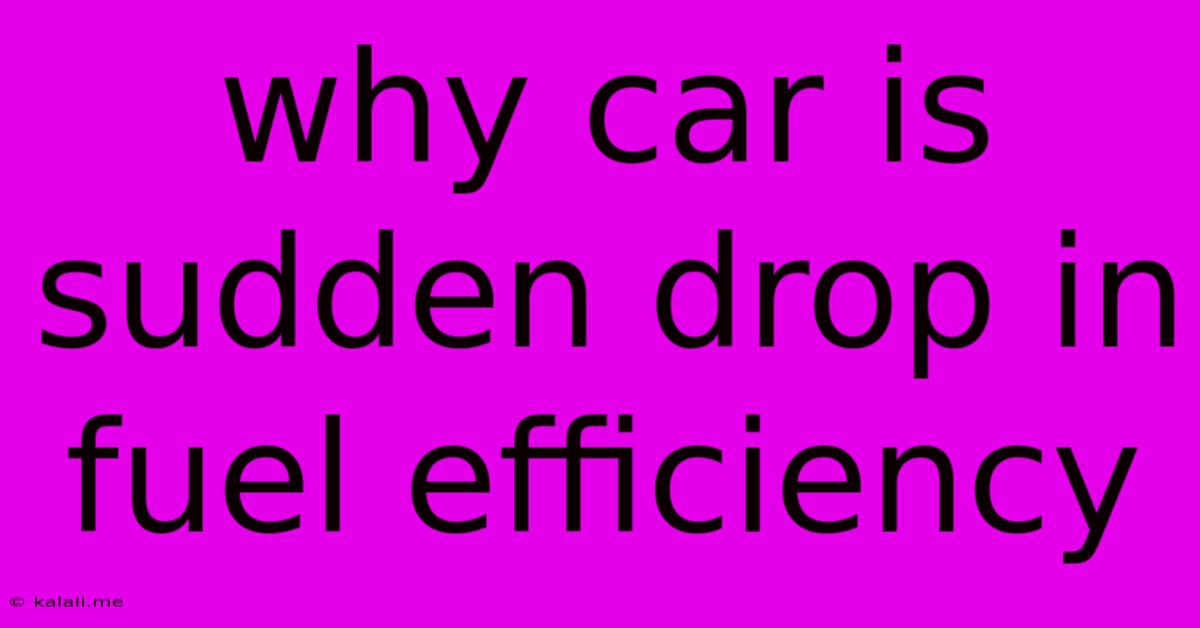Why Car Is Sudden Drop In Fuel Efficiency
Kalali
Jun 03, 2025 · 3 min read

Table of Contents
Why Your Car's Fuel Efficiency Suddenly Dropped: A Comprehensive Guide
Meta Description: Experiencing a sudden drop in your car's gas mileage? This comprehensive guide explores common causes, from simple fixes like tire pressure checks to more serious issues requiring professional attention. Learn how to identify the problem and restore your vehicle's fuel efficiency.
A sudden decrease in your car's fuel efficiency can be frustrating and costly. One day you're cruising along, getting your usual miles per gallon, and the next, you're feeling the pinch at the pump. Fortunately, understanding the potential culprits can help you pinpoint the problem and get back on track to better fuel economy. This guide will walk you through the common reasons behind this frustrating issue, from simple DIY fixes to more complex mechanical problems.
Common Causes of Sudden Fuel Efficiency Drop:
1. Tire Pressure: One of the easiest and most overlooked culprits is under-inflated tires. Low tire pressure increases rolling resistance, forcing your engine to work harder and consequently consuming more fuel. Regularly checking and inflating your tires to the recommended pressure (found in your owner's manual or on a sticker inside the driver's side doorjamb) is crucial for optimal fuel economy and safety.
2. Driving Habits: Aggressive driving – speeding, rapid acceleration, and hard braking – significantly impacts fuel efficiency. Smooth acceleration and consistent speeds can dramatically improve your MPG. Consider adopting a more fuel-conscious driving style.
3. Faulty Spark Plugs or Wires: Worn-out spark plugs or damaged ignition wires can lead to incomplete combustion, reducing engine performance and fuel efficiency. Misfires, indicated by rough idling or engine hesitation, are often a clear sign. Replacing these components is usually a relatively straightforward task for a mechanic.
4. Air Filter: A clogged air filter restricts airflow to the engine, hindering combustion and reducing fuel efficiency. Regularly replacing your air filter (as recommended in your owner's manual) ensures optimal engine performance and fuel economy.
5. Oxygen Sensor: The oxygen sensor monitors the exhaust gases and helps the engine maintain the correct air-fuel mixture. A malfunctioning sensor can lead to an inefficient air-fuel ratio, resulting in decreased fuel economy. This typically requires professional diagnosis and repair.
6. Fuel Injector Issues: Clogged or malfunctioning fuel injectors prevent the proper delivery of fuel to the engine cylinders. This can result in poor combustion and reduced fuel efficiency. Cleaning or replacing fuel injectors often requires specialized tools and expertise.
7. Transmission Problems: Problems with your car's automatic transmission, such as worn-out components or low transmission fluid, can dramatically reduce fuel efficiency. Symptoms might include slipping gears or unusual noises. Professional diagnosis and repair are essential in this case.
8. Increased Vehicle Weight: Carrying extra weight in your vehicle – passengers, cargo, or even just extra luggage – increases fuel consumption. Minimizing extra weight can contribute to better fuel efficiency.
9. Broken Catalytic Converter: A damaged or clogged catalytic converter restricts exhaust flow, leading to decreased fuel efficiency and potential engine damage. This will require a professional diagnosis and replacement.
10. Malfunctioning Mass Airflow Sensor (MAF Sensor): The MAF sensor measures the amount of air entering the engine. A faulty sensor provides inaccurate readings, leading to an improper air-fuel mixture and poor fuel economy. Repair usually involves replacement of the sensor.
Troubleshooting Tips:
- Check your owner's manual: It contains valuable information about your car's recommended maintenance schedule and fuel efficiency specifications.
- Monitor your driving habits: Pay attention to your acceleration, braking, and speed.
- Keep an eye on your dashboard warning lights: These can indicate potential problems that affect fuel efficiency.
- Consult a mechanic: If you suspect a more serious mechanical issue, seeking professional help is crucial.
By understanding these common causes and following the troubleshooting tips, you can effectively diagnose the reason for your car's sudden drop in fuel efficiency and take the necessary steps to restore it. Remember, preventative maintenance and mindful driving habits play a significant role in maximizing your vehicle's fuel economy.
Latest Posts
Latest Posts
-
How To Draw A Parabola Between Two Points Godot
Jun 05, 2025
-
If It Is Not Raining Should I Cut My Grass
Jun 05, 2025
-
What Happens When A Landlord Refuses To Give Owners Name
Jun 05, 2025
-
What Main Stats Can Sands Be
Jun 05, 2025
-
Why Does My Coffee Taste Watery
Jun 05, 2025
Related Post
Thank you for visiting our website which covers about Why Car Is Sudden Drop In Fuel Efficiency . We hope the information provided has been useful to you. Feel free to contact us if you have any questions or need further assistance. See you next time and don't miss to bookmark.